 7 citations,
January 2018 in “International Journal of Dermatology”
7 citations,
January 2018 in “International Journal of Dermatology” AGA risk factors include age, smoking, hypertension for men, and age, dyslipidemia for women; lifestyle changes may help prevention.
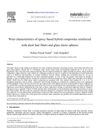 7 citations,
January 2018 in “Materials Today: Proceedings”
7 citations,
January 2018 in “Materials Today: Proceedings” Adding human hair fibers and glass micro-spheres to epoxy improves its wear resistance and strength.
 7 citations,
January 2017 in “Biological & Pharmaceutical Bulletin”
7 citations,
January 2017 in “Biological & Pharmaceutical Bulletin” Certain compounds from Panax ginseng can block proteins that affect hair growth, potentially helping treat hair loss.
 7 citations,
May 2012 in “British Journal of Dermatology”
7 citations,
May 2012 in “British Journal of Dermatology” Chemical exposure may contribute to the rise in atopic diseases and needs more research.
 7 citations,
January 2010 in “Animal”
7 citations,
January 2010 in “Animal” Angora goat hair grows faster and produces more protein than cashmere goat hair, and certain hormones and nutrients positively affect hair growth and protein synthesis.
 7 citations,
September 2008 in “Dermatologic surgery”
7 citations,
September 2008 in “Dermatologic surgery” Hair transplantation can successfully treat stubborn alopecia areata.
 6 citations,
October 2017
6 citations,
October 2017 Indian Gooseberry has potential for cancer prevention and treatment and promotes hair growth.
 6 citations,
January 2016 in “Menopause”
6 citations,
January 2016 in “Menopause” Estrogen deficiency, like after menopause or certain surgeries, leads to faster skin aging and health issues.
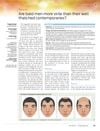 6 citations,
December 2013 in “Medical Journal of Australia”
6 citations,
December 2013 in “Medical Journal of Australia” Bald men are not more virile and may have fewer sexual partners.
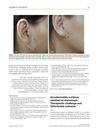 6 citations,
June 2008 in “Journal of the European Academy of Dermatology and Venereology”
6 citations,
June 2008 in “Journal of the European Academy of Dermatology and Venereology” A man with Acrodermatitis continua did not get better with etanercept treatment, and his condition worsened, suggesting treatment effectiveness may vary by genetics and race.
 5 citations,
November 2020 in “EBioMedicine”
5 citations,
November 2020 in “EBioMedicine” Disruptions in sleep-wake cycles can cause health problems like mental, metabolic, and heart diseases, and cancer.
 5 citations,
January 2014 in “Indian Journal of Dermatology, Venereology and Leprology”
5 citations,
January 2014 in “Indian Journal of Dermatology, Venereology and Leprology” Non-infectious skin conditions are more common than infectious ones in Kashmir, but community areas see more infections, suggesting a need for better skin care services in primary health care.
 5 citations,
December 2011 in “InTech eBooks”
5 citations,
December 2011 in “InTech eBooks” Eat antioxidant-rich foods, reduce fast food, and explore various treatments for vitiligo.
 4 citations,
October 2013 in “Springer eBooks”
4 citations,
October 2013 in “Springer eBooks” Melatonin receptors, found in many body parts, can help treat various diseases like depression and diabetes due to their effects on inflammation, tumor progression, sleep disorders, and body mass regulation.
 4 citations,
December 2012 in “Human Biology”
4 citations,
December 2012 in “Human Biology” The most different genetic segment between Africans and East Asians is the EDA2R/AR region, with two main types influenced by population changes and natural selection, and linked to baldness.
 4 citations,
January 2011 in “Journal of UOEH”
4 citations,
January 2011 in “Journal of UOEH” Autoimmune hair loss may be linked to increased Th1 and Th17 cells and decreased Th2 cells.
 4 citations,
January 2008 in “Food Science and Technology Research”
4 citations,
January 2008 in “Food Science and Technology Research” Mature leaves of 'Saijo' persimmon have the most vitamin C and both mature leaves and new shoots are rich in polyphenols.
 4 citations,
June 2006 in “Primary Care”
4 citations,
June 2006 in “Primary Care” The document recommends a team-based approach and personalized care for managing diabetes in teenagers.
 4 citations,
July 1994 in “Clinics in Dermatology”
4 citations,
July 1994 in “Clinics in Dermatology” Eosinophilia-myalgia syndrome, linked to contaminated L-tryptophan supplements, caused severe symptoms and some deaths, with long-term effects in survivors.
 3 citations,
December 2014 in “Steroids”
3 citations,
December 2014 in “Steroids” Fermentation of Finasteride with Ocimum sanctum L. creates new metabolite that inhibits tyrosinase.
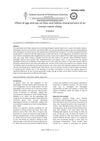 3 citations,
July 2012 in “Sokoto Journal of Veterinary Sciences”
3 citations,
July 2012 in “Sokoto Journal of Veterinary Sciences” As sheep age, their hair fibers and follicles grow larger and more organized, with no significant differences between males and females.
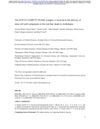 2 citations,
December 2020 in “bioRxiv (Cold Spring Harbor Laboratory)”
2 citations,
December 2020 in “bioRxiv (Cold Spring Harbor Laboratory)” The SYP123-VAMP727 complex is important for transporting materials that harden the root hair shank in Arabidopsis.
 2 citations,
August 2016 in “Lasers in Surgery and Medicine”
2 citations,
August 2016 in “Lasers in Surgery and Medicine” Photodynamic therapy can remove nonpigmented hair in mice and might work for humans.
 2 citations,
December 1983 in “Outlook on Agriculture”
2 citations,
December 1983 in “Outlook on Agriculture” Plant hormones have potential in agriculture to increase food production but require more research for effective use.
 1 citations,
August 2023 in “Biomolecules & therapeutics”
1 citations,
August 2023 in “Biomolecules & therapeutics” HAPLN1 can promote hair growth and may help treat hair loss.
 1 citations,
December 2022 in “bioRxiv (Cold Spring Harbor Laboratory)”
1 citations,
December 2022 in “bioRxiv (Cold Spring Harbor Laboratory)” Pangolins have lost some skin-related genes, but kept others, showing complex skin evolution.
 1 citations,
March 2020 in “Journal of Pharmacological Sciences”
1 citations,
March 2020 in “Journal of Pharmacological Sciences” Benzothiazepines like diltiazem reduce anxiety in mice by making neurosteroids.
 1 citations,
September 2019 in “Journal of Investigative Dermatology”
1 citations,
September 2019 in “Journal of Investigative Dermatology” The research showed that CRISPR/Cas9 can fix mutations causing a skin disease in stem cells, which then improved skin grafts in mice, but more work on safety and efficiency is needed.
 1 citations,
May 2017 in “Asian journal of medical sciences”
1 citations,
May 2017 in “Asian journal of medical sciences” The dietary supplement significantly improved skin, nails, and hair in older adults.
 1 citations,
April 2017 in “Journal of Investigative Dermatology”
1 citations,
April 2017 in “Journal of Investigative Dermatology” SM04554 may increase hair growth as a topical treatment for androgenetic alopecia.





























